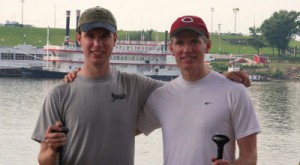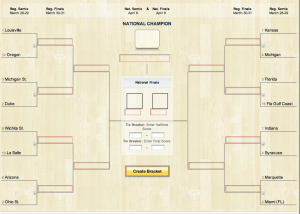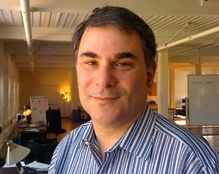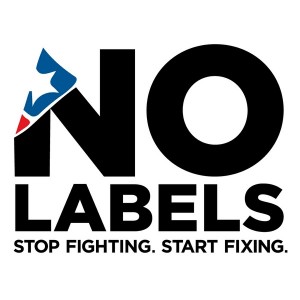By Jonathan Miller, on Mon Mar 25, 2013 at 3:00 PM ET Time for some shameless promotion for some close friends of mine: Nancy and Phil Hoffman’s creative parenting skills have now resulted in a second son achieving national artistic fame. Son #1, Scott, is “Babydaddy,” the multi-instrumentalist and bacup vocalist for the internationally-acclaimed glam-rock band Scissor Sisters.
Now, Son #2, Ben Hoffman, has launched a new program on Comedy Central, “The Ben Show,” previewed here by Rich Copley of the Lexington Herald-Leader.
Here’s a sort-0f-NSFW video that shows off Ben’s humor, as well as some truths about growing up Jewish in Lexington, Kentucky:
By Jonathan Miller, on Mon Mar 25, 2013 at 1:30 PM ET Two weeks ago, GOP U.S. Senator Rob Portman emerged as one of the first leaders of his party to openly embrace marriage equality, citing his own son Will’s recent declaration that he was gay.
Will Portman wrote a beautiful piece for the Yale Daily News about his struggle and triumph. Here’s an excerpt:
 I came to Yale as a freshman in the fall of 2010 with two big uncertainties hanging over my head: whether my dad would get elected to the Senate in November, and whether I’d ever work up the courage to come out of the closet. I came to Yale as a freshman in the fall of 2010 with two big uncertainties hanging over my head: whether my dad would get elected to the Senate in November, and whether I’d ever work up the courage to come out of the closet.
I made some good friends that first semester, took a couple of interesting classes and got involved in a few rewarding activities. My dad won his election. On the surface, things looked like they were going well. But the truth was, I wasn’t happy.
I’d make stuff up when my suitemates and I would talk about our personal lives. I remember going to a dance in the Trumbull dining hall with a girl in my class and feeling guilty about pretending to be somebody I wasn’t. One night, I snuck up to the stacks in Sterling Library and did some research on coming out. The thought of telling people I was gay was pretty terrifying, but I was beginning to realize that coming out, however difficult it seemed, was a lot better than the alternative: staying in, all alone.
I worried about how my friends back home would react when I told them I was gay. Would they stop hanging out with me? Would they tell me they were supportive, but then slowly distance themselves? And what about my friends at Yale, the “Gay Ivy”? Would they criticize me for not having come out earlier? Would they be able to understand my anxiety about all of this? I felt like I didn’t quite fit in with Yale or Cincinnati, or with gay or straight culture.
In February of freshman year, I decided to write a letter to my parents. I’d tried to come out to them in person over winter break but hadn’t been able to. So I found a cubicle in Bass Library one day and went to work. Once I had something I was satisfied with, I overnighted it to my parents and awaited a response.
They called as soon as they got the letter. They were surprised to learn I was gay, and full of questions, but absolutely rock-solid supportive. That was the beginning of the end of feeling ashamed about who I was.
I still had a ways to go, though. By the end of freshman year, I’d only come out to my parents, my brother and sister, and two friends. One day that summer, my best friend from high school and I were hanging out.
“There’s something I need to tell you,” I finally said. “I’m gay.” He paused for a second, looked down at the ground, looked back up, and said, “Me too.”
I was surprised. At first it was funny, and we made jokes about our lack of gaydar. Then it was kind of sad to realize that we’d been going through the same thing all along but hadn’t felt safe enough to confide in each other. But then, it was pretty cool — we probably understood each other’s situation at that moment better than anybody else could.
In the weeks that followed, I got serious about coming out. I made a list of my family and friends and went through the names, checking them off one by one as I systematically filled people in on who I really was. A phone call here, a Skype call there, a couple of meals at Skyline Chili, my favorite Cincinnati restaurant. I was fortunate that virtually everyone, both from Yale and from home, was supportive and encouraging, calming my fears about how they’d react to my news. If anything, coming out seemed to strengthen my friendships and family relationships.
I started talking to my dad more about being gay. Through the process of my coming out, we’d had a tacit understanding that he was my dad first and my senator a distant second. Eventually, though, we began talking about the policy issues surrounding marriage for same-sex couples.
The following summer, the summer of 2012, my dad was under consideration to be Gov. Romney’s running mate. The rest of my family and I had given him the go-ahead to enter the vetting process. My dad told the Romney campaign that I was gay, that he and my mom were supportive and proud of their son, and that we’d be open about it on the campaign trail.
When he ultimately wasn’t chosen for the ticket, I was pretty relieved to have avoided the spotlight of a presidential campaign. Some people have criticized my dad for waiting for two years after I came out to him before he endorsed marriage for gay couples. Part of the reason for that is that it took time for him to think through the issue more deeply after the impetus of my coming out. But another factor was my reluctance to make my personal life public.
We had decided that my dad would talk about having a gay son if he were to change his position on marriage equality. It would be the only honest way to explain his change of heart. Besides, the fact that I was gay would probably become public anyway. I had encouraged my dad all along to change his position, but it gave me pause to think that the one thing that nobody had known about me for so many years would suddenly become the one thing that everybody knew about me.
It has been strange to have my personal life in the headlines. I could certainly do without having my sexual orientation announced on the evening news, or commentators weighing in to tell me things like living my life honestly and fully is “harmful to [me] and society as a whole.” But in many ways it’s been a privilege to come out so publicly. Now, my friends at Yale and the folks in my dad’s political orbit in Ohio are all on the same page. They know two things about me that I’m very proud of, not just one or the other: that I’m gay, and that I’m Rob and Jane Portman’s son.
Click here to read the full piece.
By John Y. Brown III, on Mon Mar 25, 2013 at 12:00 PM ET Working, working, working.
Almost there , almost there.
But forgetting “there” is only an idea and not a location—it is only a guidepost and figment of our imagination that keeps us moving.
What if we woke up this morning and instead of “closer” to our dreams, we had “arrived”?
Me?
 I would go back to bed I would go back to bed
Which is why, I suppose, our reach should always exceed our grasp. But not by too much.
As long as we are living, we are merely “in transit” —at times forward; at times backwards; and often just sideways or adrift. And at other times we simply standstill
In this journey oflife we “arrive” not at a final destination –but the moment we realize that life is an endless journey –with maps, and GPS-es and Sherpas and guideposts
But no guarantees.
And, as the sign in the mall says, “You are here” –now.
But not for long.
And we try, for today, not to run in place or swim against the tide
But hopefully to float toward our destiny –which we know when we are doing because it feels like flying.
By Erica and Matt Chua, on Mon Mar 25, 2013 at 10:00 AM ET (What do you do when you have something amazing and you don’t want to share it? You tell people it’s terrible so that you can have it all to yourself. It was along that line of thinking that original settlers of Sirince named it Çirkince, which in Turkish means ugly. The founders discovered their own slice of heaven and didn’t want to share, so they called it ugly and lived happily ever after…until 1926. The small hamlet was renamed Sirince, which means pleasant. Now the perfect side-trip from Ephesus this pleasant little city gets it’s fair share of visitors. Pleasant may still be an understatement, but will hopefully keep the crowds at bay and preserve the beauty of this place for a few more years.

Şirince was settled when the Greek city of Ephesus was abandoned in the 15th century, but the “pleasant” town you see today dates from the 19th century. The old brick and stucco buildings with bright orange terra-cotta roof tiles and deteriorating wood shutters lend a medieval feel to the town. As you wind your way through the cobblestone streets the cafes draw you in and the welcoming owners beckon you to sit down for a hot drink.
Read the rest of…
Erica & Matt Chua: The Prettiest Ugly City in the World
By RP Staff, on Mon Mar 25, 2013 at 9:15 AM ET  Click here for a printable version of the Sweet 16 NCAA 2013 bracket No Bracket, No Pay II is proving to be almost as thrilling a competition as March Madness itself. With 53 entries competing for some awesome political prizes, Contributing RP (and former Missouri State Representative) Jason Grill holds a tight lead, one point ahead of Friend of RP Zac Byer, and two points ahead of contributing RP (and former Republican National Chairman) Michael Steele. Contributing RP (fomer Missouri House Speaker) Rod Jetton is in a tie for 9th, while The RP himself is flailing about in 21st place.
Do you regret not signing up for our competition? Are you engaged but your bracket is busted?
Good news: Here at The Recovering Politician, we not only believe in second chances; it is the very mission of our site.
So please join our Second Chance Sweet 16 prediction tournament — No Bracket No Pay II Chance II. Just click here to sign up and fill out your second chance NCAA bracket.
 It may be too late for the 52 teams already eliminated, but it is not too late for you to win! It may be too late for the 52 teams already eliminated, but it is not too late for you to win!
(It’s also never too late to join the rapidly growing No Labels movement — hundreds of thousands of Democrats, Republicans, and Independents, dedicated to problem-solving instead of hyperpartisanship, with smart, common-sense proposals like No Budget, No Pay. Sign on to our army by clicking here today!)
By Saul Kaplan, on Mon Mar 25, 2013 at 8:30 AM ET
That hungry whirring noise heard around offices across the U.S. is the sound of March Madness brackets being fed to paper shredders everywhere. Bracket busting is reaching historic levels in this year’s NCAA Division 1 Men’s Basketball National Championship Tournament. Since the tournament was created in 1939 this is the first time there are no number 1 or 2 seeds in the Final Four. All of the country’s top eight teams, as annointed by the experts, will watch the Final Four from home.
That’s amazing. It’s the first time in March Madness history that two teams, Butler (8) and VCU (11), seeded 8 or worse in their bracket will play each other in the Final Four. So if you shredded your bracket, you’re not alone. According to ESPN Research only two people out of the 5.9 million who filled out and submitted brackets in the ESPN Tournament Challenge have the Final Four correct. Only two. That’s .000034%.
As I shredded my bracket I couldn’t help thinking about the parallels between innovation and bracket busting.
 In many ways, from the time we are born, we are seeded into brackets. Education tracks, organization charts, and industry value chains are all brackets waiting to be busted. Experts are always telling us where we fit and what our role is. We are tracked into school programs at an early age based on perceived academic ability. We are placed into boxes in organization charts based on age and tenure, constrained from contributing beyond our “seed.” We work for too many organizations that only fight for market share within well-defined and accepted industry value chains. In many ways, from the time we are born, we are seeded into brackets. Education tracks, organization charts, and industry value chains are all brackets waiting to be busted. Experts are always telling us where we fit and what our role is. We are tracked into school programs at an early age based on perceived academic ability. We are placed into boxes in organization charts based on age and tenure, constrained from contributing beyond our “seed.” We work for too many organizations that only fight for market share within well-defined and accepted industry value chains.
Not only are we seeded into brackets created by someone else, we are expected to play our defined roles. Top seeds are supposed to win. Lower seeds make a valiant effort but lose to top seeds in the end. Most of us don’t even get an invite to the “big dance.” That’s the way it’s supposed to work because the experts say so…
Innovators, in their way, are bracket busters. While incremental improvements can be accomplished by working within current brackets and seeds, the biggest opportunities to create value come from transformational change, the kind of change that requires bracket busting. Solutions for the big social system challenges we face, including education, health care, energy, and entrepreneurship, require more than incremental change. The solutions we need require transformative bracket-busting business models and systems.
We need a new education system that doesn’t seed children into tracks and is designed to provide every student with a customized pathway to success. We need a new health care system that doesn’t track citizens through institutional and insurance sick care labyrinths and is designed for patients to champion their own pathways to wellness. We need organization structures that don’t constrain talent in boxes unleashing talent networks that enable everyone to contribute up to the limits of their imaginations. We need to transform industry value chains into value networks that break down boundaries between disciplines, organizations, and sectors to deliver value in completely new ways to students, patients, citizens, and consumers. We need more bracket busters.
So don’t be discouraged by your March Madness bracket now sitting at the bottom of the paper shredder. Celebrate the fact that none of the top seeds made it to the Final Four. Don’t settle for where you and your organization are seeded by so-called experts. Don’t allow anyone to say you aren’t allowed to go to the big dance. Don’t be constrained by brackets created by someone else. Create your own dance. Be the top seed in your own bracket. Be an innovator. Be a bracket buster.
(This post originally appeared here on the Harvard Business Review site.)
By Jonathan Miller, on Fri Mar 22, 2013 at 3:30 PM ET A few minutes ago, Kentucky Governor Steve Beshear vetoed the so-called “Religious Freedom Restoration Act,” a bill that would have resulted in serious unintended consequences, such as potentially undermining local civil rights ordinances, including those that prohibit discrimination against women, religious minorities, and the LGBT community.
(Please see the Governor’s statement below which outlines many of these consequences, and lists the broad umbrella of organizations that urged him to veto this bill.)
Six years ago, I withdrew from the 2007 Democratic gubernatorial primary to endorse Steve Beshear’s candidacy. I later had the honor to serve for three years as his Secretary of Finance and Administration. While Governor Beshear has done a very good job helping the Commonwealth weather the worst economic storms of my lifetime, I believe that this is his finest moment.
As always, but especially today, I am proud to call Steve Beshear a friend and my Governor.
Beshear’s veto faces a potential override by the Kentucky General Assembly. Much as many of you joined me in urging the Governor to veto this bill, I strongly advise you to contact your legislator over the weekend and urge him or her to refuse to override the Governor’s veto.
Monday, legislators will return to hundreds of “green slips” on their desk. Please help ensure the “Uphold Veto” pile is larger
Click here for a list of legislative email addresses and click here for legislators’ toll-free telephone numbers.
Please understand that many who voted “yes” did not comprehend the unintended consequences of the bill, and/or may have been afraid of the public backlash of voting for a bill that purports to uphold “religious freedom.” It is our responsibility as citizens to educate our elected officials in a civil and respectful way. Please join me.
====
UPDATED:
Here’s what veto opponents had to say about the Governor’s action:
“Gay rights groups in this state have now come out of the closet on their opposition to religious freedom,” said Martin Cothran, a spokesman for The Family Foundation.
===
Governor Steve Beshear’s Official Statement
FRANKFORT, Ky. (March 22, 2013) — Governor Steve Beshear vetoed House Bill 279 today, noting its well-placed intentions but possible significant unintended consequences.
“Religious freedom is a cornerstone of this great nation, and a right enshrined in both the United States Constitution and the Kentucky Constitution,” said Gov. Beshear. “I value and cherish our rights to religious freedom and I appreciate the good intentions of House Bill 279 and the members of the General Assembly who supported this bill to protect our constitutional rights to practice our religion. However, I have significant concerns that this bill will cause serious unintentional consequences that could threaten public safety, health care, and individuals’ civil rights. As written, the bill will undoubtedly lead to costly litigation. I have heard from many organizations and government entities that share those same concerns. Therefore, after giving this measure thoughtful analysis and consideration, today I vetoed the bill.”
HB279, sent to the Governor on March 11, would allow an individual to disregard any state or local law that places a substantial burden on his or her sincerely held religious belief. As written, the government would have to show by “clear and convincing evidence” that the state has a compelling interest in requiring the person to follow the established law,and that there is no less restrictive means to accomplish the government’s objective.
Federal law and HB279 are fundamentally different
Supporters have referenced the federal Religious Freedom Restoration Act (RFRA) and similar state RFRA laws as the template for this legislation. However, Gov. Beshear noted that House Bill 279 is fundamentally different than those laws – mostly because the vague language of HB279 lends itself to overly broad applications.
As written, HB279 imposes a heightened standard of “clear and convincing proof” to evaluate compliance with a law that contains an unclear definition of “burden,” which invites costly and possibly lengthy legal challenges. The bill offers no exceptions for certain state agencies or civil rights laws. There are no exceptions for the protection and safety of the general public, such as public health standards.
“Imprecise legal standards lead to unforeseen consequences,” said Gov. Beshear. “Citizens and governmental entities are entitled to a clear understanding of the boundaries of permissible conduct. This bill, as written, while well intended, is undermined by precarious legal wording,” said Gov. Beshear.
Possible Unintended Consequences
Groups as varied as the Kentucky Association of Sexual Assault Programs, Inc. to theNational Association of Social Workers-Kentucky Chapter to the Center for Accessible Living have called on the Governor to veto the bill, citing concerns including:
- · Weakening of local civil rights laws;
- · Impact on implementation of the new Common Core Standards in our schools;
- · Negative impact to economic development efforts;
- · Adverse impact on enforcement of drug laws;
- · Additional financial burdens on local governments; and
- · Possible withholding of needed medical care or use of religion as a justification for abuse.
State government agencies also expressed concerns to the Governor that this bill could:
- · Increase litigation costs;
- · Decrease federal funding; and
- · Threaten public health, including refusal to provide needed medication or services.
Despite his veto, Gov. Beshear expressed a willingness to work with supporters to develop a bill that might mitigate these unintended consequences. “I urge supporters and opponents of this legislation to come together before next session and find compromise legislation that protects religious freedom, while avoiding the possible unintended consequences of House Bill 279, and I pledge to work with them to find that compromise,” he said.
The following groups and elected officials urged the Governor to veto the measure, orexpressed their concerns about the bill to the Governor:
Kentucky Association of Counties
Kentucky County Judge/Executive Association
Kentucky League of Cities
Kentucky Magistrates & Commissioners Association
Kentucky Association of Sexual Assault Programs, Inc.
Kentucky Commission on Human Rights
Kentucky Education Association
Jefferson County Teachers Association (JCTA)
Center for Accessible Living, Inc.
Hispanic-Latino Coalition
Lexington-Fayette Urban County Human Rights Commission
Louisville Metro Human Relations Commission
National Assoc. for the Advancement of Colored People (NAACP)—Louisville Branch
National Association of Social Workers-Kentucky Chapter
United Food and Commercial Workers Local 227
1st District Councilwoman Attica Scott—Louisville Metro
21st District Councilman Dan Johnson—Louisville Metro
26th District Councilman Brent Ackerson-Louisville Metro
3rd District Councilwoman Mary C. Woolridge—Louisville Metro
6th District Councilman David James—Louisville Metro
9th District Councilwoman Tina Ward‐Pugh—Louisville
AIDS Volunteers of Lexington
American Civil Liberties Union of Kentucky
Americans United for the Separation of Church and State
Bereans for Fairness
Bluegrass United Church of Christ
Catholics for Fairness
Central Presbyterian Church, Louisville
Children’s Healthcare is a Legal Duty
The Church of Christ, Union (Union Church, Berea)
Douglass Boulevard Christian Church
Episcopal Church of the Advent, Louisville
Fairness Campaign
Faith Leaders for Fairness
Franklin/Simpson Human Rights Commission
Gay and Lesbian Services Organization (GLSO)
Jewish Community Relations Council of Louisville
Journey Fellowship, Owensboro
The Harvey Milk Society of Berea College
Kentuckians For The Commonwealth (KFTC)
Kentucky Alliance Against Racist and Political Repression
Kentucky Equality Federation
Kentucky Fairness Alliance
Kentucky Feminists United
Kentucky Jobs With Justice
Kentucky Religious Coalition for Reproductive Choice
Kentucky Secular Society
Kentucky Special Parent Involvement Network (KY–‐SPIN)
Kentucky Young Democrats
Lambda Legal Defense and Education Fund
Lexington Fair Housing Council
Lexington Fairness
Louisville Atheists and Freethinkers
Louisville Metro Council President Jim King
Louisville Metro Human Relations Commission Advocacy Board
Louisville Metro Human Relations Commission Enforcement Board
Louisville Showing Up for Racial Justice (LSURJ)
Mayor Greg Fischer, Louisville Metro Government
Mayor Sherry Carran, City of Covington
Metro Louisville Women’s Political Caucus (MLWPC)
Northern Kentucky Democratic League
Parents and Friends of Lesbians and Gays (PFLAG)—Lexington Chapter
People Associating Together In Owensboro (PATIO)
Planned Parenthood Federation of America
Planned Parenthood of Kentucky
Quaker Committee for Kentucky Legislation
Richard Meadows, Fayette County Commissioner
Shevawn Akers, LFUCG Council Member
SteinGroup LLC
The Women’s Network
Unitarian Universalist Church of Lexington
Women In Transition (WIT)
Women’s Leadership Conference for Religious Freedom (WLCRF)
By Jonathan Miller, on Fri Mar 22, 2013 at 2:30 PM ET
Click here to sign up for a competition — in which you can win prizes up to $5000 for developing apps to make government work. I will be serving as one of the judges. Read more below:
With the U.S. federal government careening from one crisis to the next, citizens are increasingly frustrated with the government’s inability to get things done.
We can’t solve this problem with software alone, but we can harness technology to educate and empower both citizens and lawmakers to make government more transparent or effective. The Apps for Working Governmentchallenge seeks to highlight software applications that can help reduce partisan gridlock and increase legislative productivity at the federal, state, or local level.
Individuals, teams and organizations are encouraged to enter new or existing software solutions. These can include web, mobile or desktop apps in one of two categories:
- Educational tools: Apps that visualize or analyze data to illustrate the problem of partisan gridlock, legislative productivity (or lack thereof) and/or related consequences. This category can include apps that analyze and evaluate the polarization or productivity of Congress, state legislatures, local government, or individual lawmakers.
- Solutions & action tools: Apps that citizens can use to communicate with legislators or mobilize other citizens, or tools legislators can use to advance collaboration. Submitters are required to explain how the app can be used to help reduce partisan gridlock and increase legislative productivity.
 Check out the Suggestions and Data pages for ideas and join the discussion by sharing relevant data, existing software solutions, and solution ideas. Submit a software app you’ve already made or create something new! Check out the Suggestions and Data pages for ideas and join the discussion by sharing relevant data, existing software solutions, and solution ideas. Submit a software app you’ve already made or create something new!
Early Submission: Submit your app by May 1, 2013 at 5:00pm Eastern Time to get feedback. If your app is eligible, you’ll receive tips on how you can improve it before the final deadline.
PRIZES
- Best New Applications (2)
- $1,000
- Best Existing Applications (2)
- $1,000
- Popular Choice Award – New Application
- $500
- Popular Choice Award – Existing Application
- $500
- Large Organization Recognition Award
- Awarded to competing organizations of 50+ employees. Non-cash, recognition only.
JUDGES
Tom Lee
Director of Sunlight Labs, Sunlight Foundation
John Sides
Co-founder & Contributor, The Monkey Cage, and Associate Professor of Political Science, George Washington University
JUDGING CRITERIA
- Quality of the Idea
- Includes creativity and originality
- Implementation of Idea & UX
- Includes how well the idea was executed by the developer as well as the overall design (graphics, typography, and visual aesthetic, etc.)
- Potential Impact
- Includes potential impact on partisan gridlock and legislative productivity through education and/or citizen or lawmaker action or collaboration
HOW TO ENTER
- Click the “Register For This Challenge” button at the top of the page and confirm your registration. This step ensures that you’ll receive important challenge updates and also allows you to view the submission form. Before you start building your app, be sure to read the Official Rules.
- Create a working software app or submit an existing one that falls into either category (educational tools or solutions & action tools). Refer to the category definitions in the “About the Challenge” section.
- Complete all of the required fields in the submission form.
Good luck!
By Jonathan Miller, on Fri Mar 22, 2013 at 12:30 PM ET Hating on Duke basketball dominates even when the Blue Devils are hardly the most dominant team in this year’s NCAA tournament. What gives?
Originally aired on HuffPostLive, March 22, 2013
Hosted by: Mike Sacks
Guests:
Andy Bagwell @thbthd (Cary, NC) Co-Author of ‘Duke Sucks: A Completely Evenhanded, Unbiased Investigation into the Most Evil Team on Planet Earth’
Rep. Brad Miller @RepBradMiller (Washington, DC) Retired Congressman from North Carolina
Donald Wine @blazindw (Washington, DC) Headline Monitor; Lawyer; Advisory Board Member to the WunderGlo Foundation
Ian Williams (Positano, Italy) Writer
Jonathan Miller @RecoveringPol (Lexington, KY) Former Kentucky State Treasurer
Patrick Hruby @patrick_hruby (Washington, DC) Contributor to Sportsonearth.com
By John Y. Brown III, on Fri Mar 22, 2013 at 12:00 PM ET Papal Fashion
With all this new Pope buzz and the chatter about the theological and political implications, someone is finally turning to a more practical and more interesting topic.
A good friend asked me (tongue in cheek) if women become priests, do I think they would make female cardinals wear brown?
That’s a great question. Although this issue will be decided in the Vatican it has far reaching implications that could include trademark infringement accusations right here in Louisville, KY with UPS if the Catholic Church ever tries to use the tag line “Brown Deliver”
 That is the only real practical risk I see. I do believe based on what little I know about the topic the Pope and Catholic Church will pull off a “Fashion Win” for the Church. Brown is a staid and dignified color –yet also really makes the Roman Collar pop in a reverent way that says “fashionably infallible” That is the only real practical risk I see. I do believe based on what little I know about the topic the Pope and Catholic Church will pull off a “Fashion Win” for the Church. Brown is a staid and dignified color –yet also really makes the Roman Collar pop in a reverent way that says “fashionably infallible”
At least that is my best off-the-cuff answer . That is also tongue-in-cheek. ; )
|
The Recovering Politician Bookstore
|



















